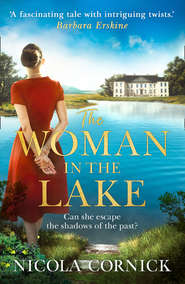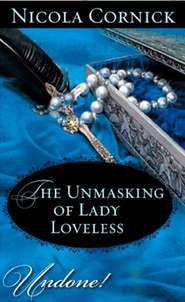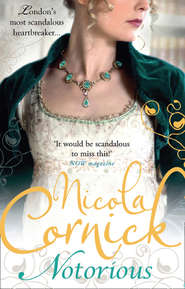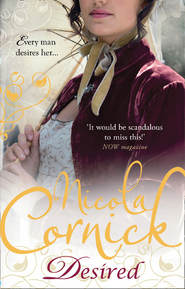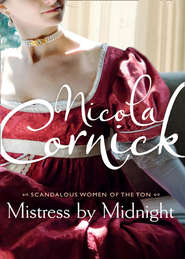По всем вопросам обращайтесь на: info@litportal.ru
(©) 2003-2025.
✖
Scandals of an Innocent
Автор
Год написания книги
2018
Настройки чтения
Размер шрифта
Высота строк
Поля
Both girls looked around as there was a clatter in the hall outside. Lizzie had evidently arrived back from her ride with Nat Waterhouse, for she could be heard chattering and laughing with Marigold, and then Alice heard her mother’s voice rising with excitement as she gave Lizzie the news.
“And the Marquis of Drummond called and I have every expectation of an engagement being announced shortly between him and Alice…”
The drawing room door crashed open. “Your mama tells me that you are going to marry Miles Vickery, Alice,” Lizzie announced as she rushed in. She pulled off her riding gloves and dropped them carelessly on the table. “Am I to congratulate you?”
“That would be premature,” Alice said.
“Ha! I thought so!” Lizzie said, flinging herself down on the window seat. “I told her you should be clapped in Bedlam if you were even considering it!”
“Well,” Alice began weakly, thinking that perhaps she should take the opportunity to start preparing the ground, but then she realized that Lizzie was not attending, anyway.
“You will not believe what has happened!” Lizzie said, sitting bolt upright and fixing her friends with a furious glare. “Nat Waterhouse is to marry that pea brain Flora Minchin!”
“Good gracious!” Alice said, startled. She remembered Miles’s lazy observation that Lizzie was in love with Nat even though she had known him forever and treated him like a brother. Miles had not, she realized now, said that Nat felt the same way. And everyone knew that Lord Waterhouse was yet another impecunious fortune hunter out to snap up a rich prize.
“How do you feel about that, Lizzie?” she asked.
“Oh, it is none of my affair if Nat chooses to throw himself away on a featherbrained heiress who will bore him silly within a se’nnight!” Lizzie said crossly. “I could not care one iota!”
Alice exchanged a look with Lydia. “I expect you told him that, too,” Lydia said.
“Of course!” Lizzie wriggled impatiently. “But I need not concern myself because it will never happen. Nat could not be so stupid as to marry that henwit. He will see sense before the knot is tied.”
Once again Alice’s eyes met Lydia’s. Lydia raised her brows slightly and Alice shook her head. Both of them knew that Nat Waterhouse was eminently capable of going through with such a marriage for money and that if he had already made Miss Minchin an offer he could not now, in honor, back out. There was no point in telling Lizzie that, of course, for she was in no mood to listen.
“Flora Minchin is a sweet-natured girl,” Alice said.
“Only because she is too stupid to be anything other than agreeable,” Lizzie snapped.
“I don’t think she is anywhere near as stupid as you think, Lizzie,” Lydia said surprisingly. “I think you misjudge her.”
“I don’t care about Flora,” Lizzie said impatiently. “The problem is that now I do not even have Nat’s escort to the ball at the Granby tomorrow, for he is to accompany Flora and her family!”
“How thoughtless of him,” Alice murmured. “Well, we shall both have to make do with my brother, Lowell. He has promised to escort me and I am sure he will be happy to do the same for you, Lizzie. Besides, you are seldom short of admirers.”
“I like Lowell,” Lizzie said, brightening. “That will be delightful.”
“He likes you, too,” Alice said dryly, “but he is wasting his time. You would make a terrible farmer’s wife.”
Lizzie laughed, her good humor restored. “With my fortune he could be a gentleman of leisure. It is worth a thought.…”
“No, it is not,” Alice said quickly. The idea of Lizzie and Lowell making a runaway match was, she thought, the worst scheme since Lizzie’s last bad idea about robbing the gown shop. Lizzie would run rings around Lowell. She needed a firm hand and Lowell was far too easygoing. “Lowell likes working for a living,” she said. “I know that may seem strange but some of us require occupation.”
“Oh, do not worry.” Lizzie yawned. “I know Lowell prefers to work morning, noon and night. We would see a great deal more of him here at Spring House if it were not so. Last time we met I told him how very tedious and bourgeois it was of him!” She slewed around in her seat so she could look at Alice properly. “And do not think that I have not noticed how restless you become when you feel you have little to do, Alice. You are the same.”
“Bourgeois,” Alice said. “I know.”
Lizzie had the grace to look a little ashamed. “I did not mean that. It is merely that you prefer to keep occupied.”
This, Alice thought, was true and well observed of Lizzie, who could sometimes surprise with her insights. “Leading the life of an heiress bores me dreadfully,” she admitted. “I need to be active. It is a pity that Mama does not feel the same. She sits here each day waiting for genteel callers who never arrive and then she feels most dreadfully snubbed.”
“Now that you plan to start a charity for destitute servants, you will be very busy indeed,” Lizzie said. “I am surprised that Mr. Churchward agreed to advance you the money for it. I hear he is very proper and some of those girls are fallen women.”
“Most of them have done nothing more than make a mistake,” Alice said carefully, wishing that Lizzie were not quite so tactless with Lydia sitting there, pregnant and unmarried, in front of her. “It is wrong to judge. Besides,” she added, to turn the subject, “I can only use my interest, not my capital, so neither of my trustees need worry that I am spending profligate sums.”
Mrs. Lister entered the room followed by Marigold with the luncheon tray. This was set out on a cloth with the Lister coat of arms embroidered on it. In vain had Alice explained to her mother that they were not entitled to use the arms because they had never been awarded to their branch of the family. Mrs. Lister had tossed her head and claimed that since the Duchess of Cole had a coat of arms, she would have one, too. She had then proceeded to embroider or net them onto anything and everything: chair backs, tablecloths and even the knitted coat worn by her pet dog.
“Oh, delicious!” Lizzie exclaimed as she saw the luncheon. “Jellied chicken and ham pies!”
Lydia had paled at the sight of the chicken and now she got hastily to her feet. “I think I will take a rest in my room,” she murmured. “No, dear ma’am—” She fended off Mrs. Lister’s inquiry as to whether she would take any food, “I have no appetite today.”
“Oh, dear,” Alice said as the door closed behind her, “she seemed so much better today. I’m afraid she will starve herself into a sickness at this rate.”
“Nat was asking after Lydia’s health,” Lizzie said, munching through one of the little pork pies.
“So was Lord Vickery,” Alice said, accepting the cup of tea that Marigold proffered.
“Nat asked if she ever received any letters,” Lizzie added. “I thought it an odd question, for why should he be interested? And who would write to her? Her cousin Laura is close by so need not send letters, and the rest of her family have cut her off and it is not as though she will ever hear from Tom.…”
Alice paused, remembering that Miles had asked if the wedding dress had been for Lydia. She had been startled, because the only person Lydia was likely to marry was Tom Fortune and he was locked up in jail. And then Miles had also asked if Lydia ever saw anyone, and Nat had asked if she received any letters…A nasty suspicion formed in Alice’s mind and she looked sharply at Lizzie to see if the same doubts had also occurred to her, but Lizzie was digging her spoon into the dish of jellied chicken and chattering to Mrs. Lister about what she could see in the tea leaves.
“The raven,” Mrs. Lister said, peering into the depths of her cup. “That means bad news or a reversal of fortune.”
“That will be for Lord Vickery then,” Lizzie said. “Nat told me that he was planning to auction off the contents of Drum Castle next week because he is so debt-ridden that he will be clapped in the Fleet before long.”
Alice remembered the bleak look in Miles’s eyes when he had told her he stood to lose everything. No wonder he had pressed her so hard to accept him. He had not lied when he said that he would be ruined by debt. She struggled against a sudden and treacherous feeling of sympathy for Miles having to endure the humiliation of losing his entire birthright in so public a manner. Then she felt angry at her own weakness. Miles deserved no pity from her.
“Truly?” she said. “Lord Vickery’s situation is genuinely that bad?”
“Worse than bad,” Lizzie said cheerfully. “That is why the sale is happening so soon. The lawyers pressed Lord Vickery to it as soon as he inherited as the only way to save himself. They are to sell off the farmland and other parts of the estate, and the entire contents of the castle. The only thing that cannot be sold is the castle itself, for it is entailed.” She turned back to Mrs. Lister. “I thought that we might take the carriage out to Drum next week, ma’am, and see how the sale goes? We could buy ourselves a few souvenirs—”
“Lizzie, no!” Alice said, revolted. “That is like vultures picking over a carcass!”
“Well someone has to buy the goods,” Lizzie said, unmoved, “and it might as well be us! I hear that the late marquis had some delightful porcelain figures—though not all of them are quite respectable—but I know that your mama would like to increase her collection by buying some of the more tasteful ones.”
This decided the matter. Mrs. Lister was most enthusiastic, and Alice found herself overruled. “For, my dear,” Mrs. Lister said reasonably, “our money is as good as anyone else’s and I think we should make a show.”
It went much against the grain with Alice, but then she thought of Miles’s ruthless attempt to blackmail her into marriage and she felt cold and sick. Why was she wasting her sympathy on a man who did not understand the meaning of the word compassion? He deserved nothing from her other than her absolute disdain. Her money was her own to do with as she chose until she wed, provided that her trustees approved. If she embarrassed Miles by making a vulgar show of her fortune only a week after being blackmailed into accepting his hand in marriage, then he had no one to blame but himself.
“By all means let us go to Drum,” she said, “and buy up the marquis’s entire estate if we wish. The more I think about it, the more the idea appeals to me.”
Chapter Six
“OH, DARLING, I cannot believe that such an appalling thing could have happened!” Dorothea, the Dowager Lady Vickery, rushed into the drawing room of Drum Castle, enfolded her elder son in a scented embrace, then released him to stand back and dab artistically at her eyes with her inadequate and lacy handkerchief. “I am so sorry for you, Miles, darling! To have inherited the Marquisate of Drum is…Well, it is quite…” Words seemed to fail her and she took refuge once more in wiping the tears from her eyes.
“It’s a damned disaster,” Miles finished for her, “begging your pardon, Mama.” He had been working on the estate finances in preparation for Churchward’s visit, and the grim columns of figures had not improved his mood. Drum had been badly run for years and had brought in very little income. His cousins had suffered from a congenital failure to understand that they had no money to spend. The combination of the two was disastrous and meant that he was more deeply in debt than he had realized. Alice’s eighty thousand pounds would clear most of the debt, and selling off those parts of the estate that were not entailed would ease the situation a little, but once he and Alice were married and her money spent the two of them would have nothing other than his Home Office salary—which was barely enough for one to live on, not two—and this ruined monstrosity of a castle. They would be surviving on credit for the rest of their lives unless he could think of a way to make a fortune.
Under the circumstances the arrival of his mother was about as welcome as one of the plagues of Egypt. He looked at her with ill-concealed impatience. “Might I ask what you are doing here, ma’am?” he said. “I really did not expect this.”






